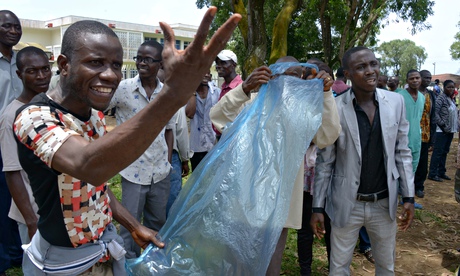Ebola outbreak: call to send in military to West Africa to help curb epidemic
Head of Médecins sans Frontières urges UN to dispatch disaster response teams as cases and deaths continue to surge
Medical workers of the John F Kennedy hospital of Monrovia show the aprons they have been wearing during a strike. Photograph: Dominique Faget/AFP/Getty Images
Sarah Boseley, health editor
Tuesday 2 September 2014
Military teams should be sent to West Africa immediately if there is to be any hope of controlling the Ebola epidemic, doctors on the frontline told the United Nations on Tuesday, painting a stark picture of health workers dying, patients left without care and infectious bodies lying on the streets.
The international president of Médecins sans Frontières, Dr Joanne Liu, told member states that although alarm bells had been ringing for six months, the response had been too little, too late and no amount of vaccinations and new drugs would be able to prevent the escalating humanitarian disaster.
"In West Africa, cases and deaths continue to surge," she said. "Riots are breaking out. Isolation centres are overwhelmed. Health workers on the frontline are becoming infected and are dying in shocking numbers.
"Others have fled in fear, leaving people without care for even the most common illnesses. Entire health systems have crumbled."
She said Ebola treatment centres had been reduced to places where people went to die alone.
"It is impossible to keep up with the sheer number of infected people pouring into facilities. In Sierra Leone, infectious bodies are rotting in the streets," she said. "Rather than building new Ebola care centres in Liberia, we are forced to build crematoria."
The World Health Organisation estimated last week that 20,000 people in Guinea, Liberia and Sierra Leone have been infected over three months. Médecins sans Frontières has doubled its staff of volunteer doctors in the region but is unable to cope.
The epidemic can be stopped, said Liu, but only if governments send in their biohazard teams and equipment.
"Many of the member states represented here today have invested heavily in biological threat response," she said at the UN. "You have a political and humanitarian responsibility to immediately utilise these capabilities in Ebola-affected countries.
"To curb the epidemic, it is imperative that states immediately deploy civilian and military assets with expertise in biohazard containment. I call upon you to dispatch your disaster response teams, backed by the full weight of your logistical capabilities. This should be done in close collaboration with the affected countries. Without this deployment, we will never get the epidemic under control."
Money is no longer the main issue, according to MSF, and voluntary help is not enough. Skilled and well equipped teams are needed on the ground.
Governments should send in military and civilian experts who can scale up the numbers of isolation centres and deploy mobile laboratories that can be used to diagnose more cases.
Military-style operations are required to establish dedicated air bridges to move personnel and equipment around West Africa and a regional network of field hospitals must be built to treat medical staff who are infected or suspected of being infected. About a tenth of the deaths have been among health workers.
"We must also address the collapse of state infrastructure," Liu said. "The health system in Liberia has collapsed. Pregnant women experiencing complications have nowhere to turn.
"Malaria and diarrhoea, easily preventable and treatable diseases, are killing people. Hospitals need to be reopened and newly created."
Lastly, she said, there must be a change of approach by affected countries. "Coercive measures, such as laws criminalising the failure to report suspected cases, and forced quarantines, are driving people underground.
"This is leading to the concealment of cases, and is pushing the sick away from health systems. These measures have only served to breed fear and unrest, rather than contain the virus."
Liu was speaking as nurses in Liberia went on strike for better pay and equipment to protect themselves from Ebola.
John Tugbeh, spokesman for the strikers at John F Kennedy hospital in Monrovia, said the nurses would not return to work until they are supplied with "personal protective equipment (PPEs)", the hazmat-style suits that guard against infectious diseases.
"From the beginning of the Ebola outbreak we have not had any protective equipment to work with. As a result, so many doctors got infected by the virus. We have to stay home until we get the PPEs," he said.
The surgical section at John F Kennedy hospital is the only trauma referral centre in Liberia. The hospital closed temporarily in July owing to the infections and deaths of an unspecified number of health workers who had been treating Ebola patients.
"We need proper equipment to work with [and] we need better pay because we are going to risk our lives," Tugbeh said.
The UN has also warned of serious food shortages as a result of restrictions on movement in the Ebola-hit countries. "Access to food has become a pressing concern for many people in the three affected countries and their neighbours," said Bukar Tijani, Food and Agricultural Organisation regional representative for Africa.
"With the main harvest now at risk and trade and movements of goods severely restricted, food insecurity is poised to intensify in the weeks and months to come."

